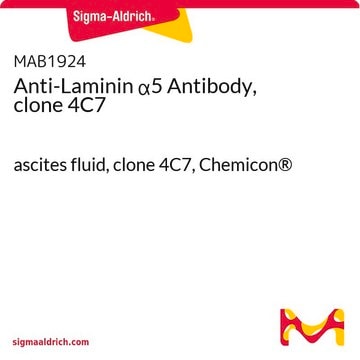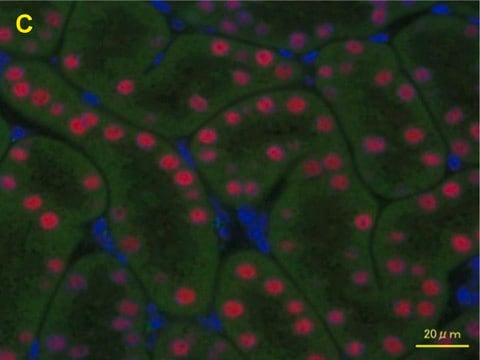MAB4360
Anti-TRA-1-60 Antibody, clone TRA-1-60
clone TRA-1-60, Chemicon®, from mouse
Szinonimák:
TRA-1-60 Marker
About This Item
Javasolt termékek
biológiai forrás
mouse
Minőségi szint
antitest forma
purified antibody
antitest terméktípus
primary antibodies
klón
TRA-1-60, monoclonal
faj reaktivitás
human
gyártó/kereskedő neve
Chemicon®
technika/technikák
flow cytometry: suitable
immunocytochemistry: suitable
immunofluorescence: suitable
immunoprecipitation (IP): suitable
western blot: suitable
bemenet
sample type induced pluripotent stem cell(s)
sample type: human embryonic stem cell(s)
izotípus
IgM
kiszállítva
wet ice
célzott transzláció utáni módosítás
unmodified
Géninformáció
human ... PODXL(5420)
Általános leírás
Egyediség
Immunogen
Alkalmazás
Western Blot: A previous lot of this antibody was used in WB.
Immunoprecipitation: A previous lot of this antibody was used in IP.
Immunohistochemistry: A previous lot of this antibody was used in IH.
Flow Cytometry: A starting range of 10-20 µg/mL is suggested.
Optimal working dilutions must be determined by the end user.
Stem Cell Research
Pluripotent & Early Differentiation
Cél megnevezése
Fizikai forma
Tárolás és stabilitás
Analízis megjegyzés
NTERA-2 cl.D1 whole cell lysate (pluripotent stem cells derived from teratocarcinoma and are considered the malignant counterparts of human embryonic stem cells)
Egyéb megjegyzések
Jogi információk
Jogi nyilatkozat
Nem találja a megfelelő terméket?
Próbálja ki a Termékválasztó eszköz. eszközt
Tárolási osztály kódja
12 - Non Combustible Liquids
WGK
nwg
Lobbanási pont (F)
Not applicable
Lobbanási pont (C)
Not applicable
Analitikai tanúsítványok (COA)
Analitikai tanúsítványok (COA) keresése a termék sarzs-/tételszámának megadásával. A sarzs- és tételszámok a termék címkéjén találhatók, a „Lot” vagy „Batch” szavak után.
Már rendelkezik ezzel a termékkel?
Az Ön által nemrégiben megvásárolt termékekre vonatkozó dokumentumokat a Dokumentumtárban találja.
Cikkek
Skip weekend feedings. Defined serum-free and feeder-free expansion media for human pluripotent stem cells (ES and iPS cells). See publications and protocols.
Fibroblast growth factors (FGFs) regulate developmental pathways and mesoderm/ectoderm patterning in early embryonic development.
The Simplicon™ RNA Reprogramming Technology is a next generation reprogramming system that uses a single synthetic, polycistronic self-replicating RNA strand engineered to mimic cellular RNA to generate human iPS cells.
Tudóscsoportunk valamennyi kutatási területen rendelkezik tapasztalattal, beleértve az élettudományt, az anyagtudományt, a kémiai szintézist, a kromatográfiát, az analitikát és még sok más területet.
Lépjen kapcsolatba a szaktanácsadással







